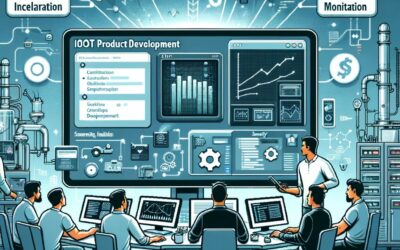As the world is moving towards an era of automation and digitization, it is becoming increasingly important for DevOps teams to understand and leverage the benefits of Artificial Intelligence (AI). With its ability to automate complex tasks and streamline processes, AI can streamline development and deployment processes. Also, it can enhance the overall efficiency of business enterprises. In this article, we will explore how can a DevOps team take advantage of artificial intelligence to improve processes and enhance their offerings.
Potential Benefits of Using AI in DevOps
Organizations can enjoy numerous benefits by incorporating AI into DevOps processes. AI has revolutionized the way DevOps teams operate. AI-enabled monitoring tools and AI algorithms can assist the DevOps team in problem-solving, predictive maintenance, workflow optimization, and effective decision-making. Some of the most common benefits of using AI in DevOps include:
Automation of Repetitive Tasks
Automating repetitive tasks is one of the most significant benefits of using AI in DevOps. DevOps teams often spend considerable time on repetitive and time-consuming tasks. AI-enabled tools can automate these tasks. These tools allow DevOps teams to focus on more strategic and critical tasks.
Problem-Solving
AI algorithms assist in identifying and solving problems in the software development life cycle. It includes detecting and fixing bugs, identifying performance issues, and optimizing code. In addition, AI algorithms analyze log files and other sensitive data to detect issues and provide recommendations for solutions. As a result, it helps DevOps teams resolve problems faster and improve the overall quality of service.
Predictive Maintenance
Another advantage of using AI in DevOps is predictive maintenance. AI tools can be used to monitor system performance and predict when maintenance or upgrades are necessary.
Workflow Optimization
Artificial intelligence can optimize the DevOps workflow by providing real-time updates and feedback. It will improve collaboration and communication among team members. Also, it will lead to faster problem-solving, product delivery, and improved performance.
Improved Decision-Making
AI algorithms can assist DevOps teams in making better decisions by providing valuable insights and data-driven recommendations. With AI algorithms, DevOps teams can make informed decisions about the development and deployment processes.
Creating Effective Teams
Artificial intelligence (AI) can help create effective DevOps teams by automating repetitive tasks and optimizing workflows. By automating tasks, DevOps teams can work more efficiently and collaboratively, leading to improved performance and faster product delivery.
Monitoring System Performance
AI-enabled tools can assist in monitoring system performance and provide real-time updates and feedback to DevOps teams. As a result, it helps DevOps teams in ongoing maintenance and fixes issues faster.
Enhanced Security
Artificial intelligence can enhance security by detecting and preventing potential security threats. AI tools can monitor access to sensitive data and alert DevOps teams of any security breaches. It helps DevOps teams to improve their security skills and protect sensitive data.
AI Can Help with Code Testing
Artificial Intelligence (AI) has the potential to revolutionize the way code is tested, making the process faster, more efficient, and less prone to errors. DevOps teams can take advantage of AI by integrating it into their testing processes and automating repeatable tasks. With AI, code changes can be detected and tested much faster. By using AI, DevOps teams can streamline their processes and increase their productivity, ensuring that code changes are tested thoroughly and accurately with minimal human intervention.
AI Helps with Automated Deployment
Artificial Intelligence (AI) revolutionizes how IT companies and business enterprises handle automated deployment processes. AI is helping to streamline repeatable processes and reduce costs by automating tasks that would otherwise be performed manually. AI also helps with the entire delivery process, providing an end-to-end solution that helps businesses improve their productivity and reduce the time-to-market.
Best Tools to Integrate DevOps with Artificial Intelligence
In the ever-evolving world of technology, software development increasingly relies on Artificial Intelligence (AI) systems. As a result, DevOps engineers are utilizing AI to make their software development process more efficient and cost-effective.
Chatbots
Chatbots are becoming essential for DevOps professionals, allowing quick and easy communication between developers, testers, and clients. In addition, chatbots can automate repetitive tasks such as responding to client queries and resolving technical issues. They can also be used to monitor software development projects and provide real-time updates to stakeholders.
Virtual Assistants
Virtual assistants can help DevOps teams streamline their work by performing tasks such as setting up test environments, creating and managing work items, and even conducting performance testing. VA can also be integrated with other AI systems to provide real-time feedback and insights.
AI-Enabled Monitoring Tools
AI-enabled monitoring tools can help DevOps teams identify and fix performance issues faster. By leveraging machine learning algorithms, these tools can detect abnormalities, predict potential problems, and provide recommendations for improving performance.
AI-Enabled Testing Tools
AI-enabled testing tools are changing the way software is tested. By automating repetitive testing tasks, AI-enabled testing tools can significantly reduce the time and effort needed for software testing. As a result, it will lead to faster time-to-market and improved software quality.
Things to Consider While Implementing AI in DevOps
As AI continues to evolve, many businesses and organizations are looking to integrate AI models into their DevOps processes. However, there are several important things to consider before implementing artificial intelligence in DevOps.
The Quality of Data
The quality of data is a key factor when implementing any AI solution. Poorly-structured or incomplete data can lead to inaccurate analysis and unreliable results. Therefore, software developers must ensure that their datasets are accurate, up-to-date, and complete before relying on AI systems to make decisions.
The Management of Data
Another crucial aspect of implementing AI models in DevOps is data management. With the increasing amount of data being generated, it is essential to have a robust system to store, manage, and analyze it. Hence, it requires the operations team to have a deep understanding of data storage and management technologies, as well as the ability to implement and manage them effectively.
The Ethical Concerns
As developers increasingly rely on AI solutions in DevOps, it is also essential to consider its ethical implications. For example, using AI in DevOps can raise questions about data privacy, bias, and accountability. As a result, DevOps experts and business enterprises must consider ethical concerns and develop policies and procedures to mitigate them.
The Potential for Disruption
It is critical to consider the potential for disruption that comes with implementing AI in DevOps. AI systems can automate many manual tasks, transforming DevOps processes and making them more efficient. However, this automation can also disrupt the operations team, making it difficult for them to adapt to the new technology. Therefore, DevOps experts and business enterprises must prepare for this potential disruption and plan a smooth transition.
Limitations of Using AI in DevOps
Machine learning and AI systems can be incredibly useful tools for automating processes such as log management. However, it is crucial to consider certain limitations of using these tools to ensure you are using them effectively.
AI systems depend heavily on log files and data to learn and predict. AI systems can make incorrect decisions if the log files are inaccurate or incomplete. As a result, it will lead to significant problems. Also, this lack of transparency makes it challenging for organizations to understand how the AI system makes its decisions. Ultimately, it will limit their ability to troubleshoot problems or make modifications.
Another limitation of AI systems is that they lack human intelligence. AI systems can be programmed to perform a particular task, but they do not have the ability to think critically or creatively. This lack of intelligence means that AI systems can be limited in responding to new or unexpected situations, which could impact their ability to deliver effective DevOps solutions.
AI systems can be expensive to implement and maintain. Also, the expertise is required to develop, implement, and maintain AI systems, which can be a high cost for businesses. Moreover, AI systems require ongoing monitoring and maintenance to ensure they function properly, which can be time-consuming and resource-intensive.
How Can AI Improve the Quality of Software Developed by DevOps Teams?
By using AI, DevOps teams can take advantage of its ability to identify patterns and automate repetitive tasks, significantly improving software quality. With AI, DevOps teams can deliver high-quality software faster, making them more productive and efficient. Adopting AI technology is the next step for IT companies and business enterprises to stay ahead of the competition.
How Can DevOps Teams Effectively Implement AI in Their Workflow?
By incorporating AI, DevOps teams can take advantage of underutilized resources, optimize processes, automate repetitive tasks, and gain valuable insights into the entire software development lifecycle. One effective way to implement AI is by using AI-powered tools and platforms that can automate various DevOps processes such as testing, deployment, and monitoring.
FAQ’s
How Can DevOps Use AI?
- DevOps can use AI to access sensitive data and analyze it in real-time to make informed decisions.
- AI can help the DevOps team automate repetitive tasks, allowing them to spend more time on complex and strategic work.
How to Improve the Performance of Artificial Intelligence in DevOps Problem-Solving?
- Considering having a well-defined monitoring infrastructure.
- Implementing AI tools can lead to significant cost savings and increased efficiency in DevOps problem-solving.
What Are the Benefits of DevOps?
- Increased collaboration between DevOps teams
- Ability to identify underutilized resources
- Streamlined and optimized processes
- Automated testing and deployment
- Increased efficiency and productivity
- Enhanced customer satisfaction
- Improved security and risk management
- Better ability to handle complex tasks
- Increased innovation and competitiveness




